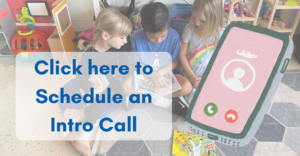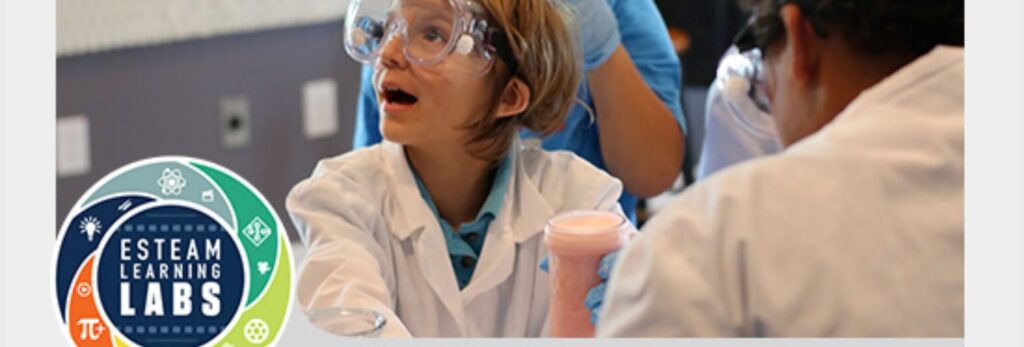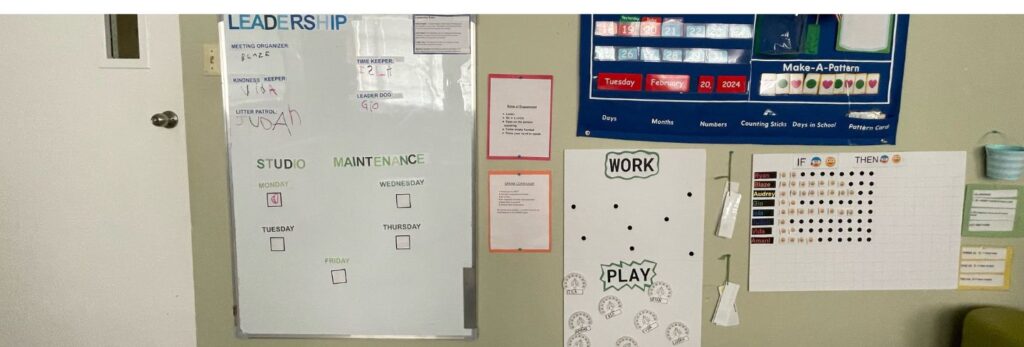- Discovery Strategy Games
- Nature Day with Miss Kathleen
- Student-led Montessori Circle Time
With our inaugural year under our belts and our second year right around the corner, we are turning up the heat on our daily schedule and learning design to make it more hands-on, learner-driven and fun. In addition, we are excited to settle into our new space in the educational building of Hyde Park Presbyterian Church in the heart of Hyde Park and offer an after school program this year. If you are new to Apollo Academy, learn more about us here.
New Location
We are thrilled to partner with the team at HPPC. From Apollo Academy's inception, we've been intentional about only partnering with organizations whom we align on core values. From our first conversations back in January, it was evident how much they value community, outreach to everyone and are open to our modern learner-driven approach to education.
They had a move-in ready space for us that meets all of our requirements, plus so many other bonuses like a creative maker's space, a shaded parking lot for a basketball hoop, a recently renovated playground and so many pianos. They also made room for our "parent co-working space" that provides our parents a quiet place to work and overlooks our playground. This allows our parents who have a longer commute or would like to stay close on tough mornings (because we all have them) an inviting place to be in our school.
Daily Schedule
We've update our daily schedule to give our learners enough time to earn their core skill badges, but also preserve the important free play and outdoor time. Our studios are divided between Spark (typically children ages 5-7) and Discovery (typically children ages 7-11) and each has their own schedule:
Apollo Academy 23-24 Daily Schedule
In addition to our full-time program, Apollo Academy offers a three-day (Tuesday through Thursday) homeschool hybrid option. Read more about our homeschool hybrid program here.
Learning Design Preview
Our learning design is made up of three parts:
-
- Core skills (reading, writing, spelling & math)
- Non-core skills (science, civilization, problem-solving, critical thinking, entrepreneurship, etc.)
- "Learning to be" (character building).
1. Core Skills
Our core skills approach is designed to require mastery of foundational concepts so that our learners have the toolkit to build upon and develop as they continue to more complex and cross-discipline work. A fundamental difference about our approach from traditional school is that everyone goes at their own pace in all core subjects. Our environment is designed to support every learner in their journey and meet them where they are.
Here is a snapshot of our core skill learning design:

Reading, Writing and Spelling
The basis of our English language arts program is to offer tools to build a strong foundation to support our learners as they grow into strong readers and communicators. We use the Ortin-Gillingham, phonics-based approach to learn how to read. We do not leverage less helpful tactics like guessing with context or memorizing sight words. Our Spark learners focus on phonics until they can decode well enough to start the Waseca reading program. All learners work independently on the Waseca reading program, then eventually jump into the Waseca grammar boxes to master English grammar. We love Waseca because it's a hands-on Montessori process using a world-class approach to reading and grammar.
Apollo Academy also incorporates writing with purpose and learning the writing process informally through journaling, character call outs, peer-written birthday cards, and more formally through Writer's Workshop.
We pair Waseca with Nessy Spelling, Hairy Reading and Lexia Core5 to round out our robust program designed to give learners the tools they need to master the five pillars of literacy.
Lastly, our learners are practicing reading and communicating all day every day it's reading the daily schedule, writing the answer to a challenge, reading to each other during DEAR (drop everything and read), signing in when they arrive in the morning or reading instructions or a challenge during quest.
Mathematics
For Spark, our Montessori Math Workbook pairs concrete Montessori math with abstract math to build both a strong number sense and give practical and multi-sensory tools to learn foundational mathematical concepts. It starts as basic as counting from zero, but it's use of colored pencils, glue, tape and scissors paired with Montessori manipulatives makes it a fun choice and discreetly helps our learners improve their fine motor skills.
Our Discovery learners can also use Montessori Math Workbook, but when they are ready start Dreambox is am adaptive-learning game-based program. Our Discovery learners also race against the clock on Aleks Quicktables to prove their mastery of basic math facts.
Lastly, other learning design elements such as morning circle time for Spark and quest challenges for Discovery offer real-world problem-solving using math.
2. Non-Core Skills
Apollo Academy follows the Acton Academy model for non-core learning design through quests (project-based hands-on experiments, challenges and activities) and civilization (study of history). Last year we completed quests such as Ancient Apollo Athens, Zoology, Entrepreneurship, Strategy Games and Marine Science. In addition to the three quests we do every year (Build the Tribe, Entrepreneurship and Growing Curiosity), we have an amazing line-up for this year. To read more about each quest, click the 2023-2024 Apollo Academy Quest Overview.

Quests last between three and six weeks and always end with an exhibition where our learners put on a program 100% designed, rehearsed and programmed by them! Check out our Instagram (@ApolloAcademyTampa) reels to watch the exhibition highlights from last year.
3. Learning to Be
An important part of who we are as a school is to focus on character building. While this is by far the toughest aspect to "measure," it's also one of the most obvious areas of growth that our parents see in our learners throughout the school year. Whether it's demonstrating more kindness towards their siblings or being able to manage a difficult situation with emotional intelligence and self-regulation, our environment allows learners the freedom to practice being whole. We accomplish this through our morning Socratic launches, learning to be badge plans and our guides' focus on making the small moments count. This year we will pull from Acton Academy's library of launches that offer a Socratic discussion to inspire, connect or equip our learners for the day ahead. We are continuing to incorporate the "learning to be" badges into the weekly goal setting and are excited to loop families into the process. Click here to read our Apollo Academy Lean-To-Be & Life Skills Badge.
After School Program
Apollo Academy is offering an after school program for learners at Apollo Academy, Gorrie Elementary and 6th graders at Wilson Middle School. The program is from after school until 5pm on regular school days, per the Hillsborough County Public School calendar. The cost varies, but ranges from $50 per child to $125 per child per week. Click here to learn more or contact us via the form at the bottom of the page. Space is limited and on a first come, first serve basis.
At Apollo Academy, we are dedicated to encouraging each child to explore the world and to forge their learning journeys. To learn more about Apollo Academy and our approach to education, schedule an intro call here or check out our resources here. You can also find us on Instagram @ApolloAcademyTampa.






